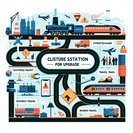
In a 13 November phone call with Ukrainian President Volodymyr Zelenskiy, German Chancellor Friedrich Merz urged Kyiv to discourage large-scale migration of Ukrainian men to Germany, saying they are “needed at home.” Speaking hours later at a Berlin trade congress, Merz linked the appeal to draft legislation that will tighten social-benefit eligibility for new Ukrainian arrivals after 1 April 2025. Under the plan, those arriving after that date would fall under the lower-paying Asylum Seekers’ Benefits Act instead of Germany’s Bürgergeld, although immediate labour-market access would remain.
Eurostat recorded 79,205 Ukrainian refugees entering the EU in September, the highest monthly tally since August 2023, citing Kyiv’s decision to allow men aged 18–22 to leave. Germany now hosts more than 1.2 million Ukrainians—28 percent of the EU total—straining accommodation budgets in several Länder.
![Merz Tells Zelenskiy Ukrainian Men Should Stay Home as Germany Plans Benefit Changes]()
The draft bill, expected to clear cabinet next week, also includes stronger job-centre counselling and employer-matching to shift refugees from welfare into work. Critics warn that lowering benefits could push newcomers into undeclared employment; proponents argue it aligns incentives and eases municipal budgets.
For global-mobility teams, the change may complicate dependent-relocation policies if accompanying Ukrainian spouses fall under different benefit regimes. Employers hiring Ukrainian talent should factor in administrative support for residence permits and German-language training, as labour-market access alone may not guarantee smooth integration.
The episode highlights Germany’s broader recalibration of refugee policy—tightening benefits and supporting rapid employment—while still signalling political solidarity with Ukraine.
Eurostat recorded 79,205 Ukrainian refugees entering the EU in September, the highest monthly tally since August 2023, citing Kyiv’s decision to allow men aged 18–22 to leave. Germany now hosts more than 1.2 million Ukrainians—28 percent of the EU total—straining accommodation budgets in several Länder.

The draft bill, expected to clear cabinet next week, also includes stronger job-centre counselling and employer-matching to shift refugees from welfare into work. Critics warn that lowering benefits could push newcomers into undeclared employment; proponents argue it aligns incentives and eases municipal budgets.
For global-mobility teams, the change may complicate dependent-relocation policies if accompanying Ukrainian spouses fall under different benefit regimes. Employers hiring Ukrainian talent should factor in administrative support for residence permits and German-language training, as labour-market access alone may not guarantee smooth integration.
The episode highlights Germany’s broader recalibration of refugee policy—tightening benefits and supporting rapid employment—while still signalling political solidarity with Ukraine.








